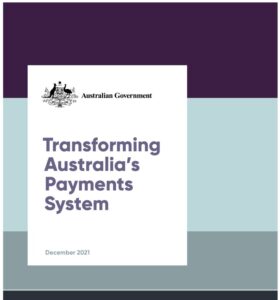
The Australian Government has published its proposed regulatory framework in response to 3 reviews of new technologies that affect Australia’s payment system: the Review of the Australian Payments System, the Senate Select Committee on Australia as a Technology and Financial Centre Final Report, and the Parliamentary Joint Committee Corporations and Financial Services Report on Mobile Payment and Digital Wallet Financial Services.

The reviews identified regulatory gaps which could contribute to increased risks of consumer and business harm, possible future systemic instability, competition risks and impeding private sector investment in innovative products and services.
The proposals also encompass the conclusions of the Council of Financial Regulators’ Regulation of Stored-value Facilities in Australia .
Its proposals will be consulted on in early 2022, finalised by mid-2022 and assessed at least annually thereafter.
They involve co-ordination between Treasury, the Reserve Bank, Austrac, the ATO and the ACCC.
Review of the Australian Payments System
- The Government will modernise the relevant provisions and arrangements within the Payment Systems (Regulation) Act 1998 (PSRA). This will ensure that regulation should be functionally based, to ensure appropriate regulatory coverage of payments-related entities, and to provide regulatory clarity to industry.
- The Government agrees to a new single, tiered payments licensing framework based on a list of payment functions which would be implemented as part of the Australian Financial Services Licence (AFSL) Regime and administered by ASIC.
- A condition of the holding the licence participants should comply with obligations under an updated ePayments Code.
- Compliance with technical standards set by industry standard setting bodies (including the Australian Payments Network) in consultation with the Reserve Bank should be mandatory for payments licence holders.
Senate Committee Australia as a Financial and Technology Centre Final Report
- The Australian Government will establish a market licensing regime for Digital Currency Exchanges. Treasury will consult on which functions of Digital Currency Exchanges are appropriate to be licensed by ASIC and what these obligations should entail.
- Treasury will develop and consult on a possible custody or depository regime for digital assets with minimum standards.
- Treasury, with the support of financial regulators and in consultation with industry, will conduct a token mapping exercise to identify relevant characteristics of digital assets.
- Treasury will consult with industry on an appropriate regulatory structure for innovative new corporate structures like Decentralised Autonomous Organisations.
- The Treasurer will task the Board of Taxation to commence a review into the appropriate policy framework for the taxation of digital transactions and assets. In the interim, Treasury will liaise with the Australian Taxation Office on the potential for issuing more expansive guidance on the current tax treatment of crypto-assets.
- The Treasury will lead a policy review of the viability of a retail Central Bank Digital Currency (CBDC) in Australia.
- The Treasurer will request Council of Financial Regulators work with relevant agencies to consider the underlying causes and possible policy responses to de-banking of foreign currency conversion services in Australia, including considering the 2019 ACCC proposal for a due diligence scheme to address the due diligence requirements of banks, options for greater transparency for businesses who have been de-banked or other relevant proposals.
Parliamentary Joint Committee Corporations and Financial Services report: Mobile Payment and Digital Wallet Financial Services
- The definition of a payments system within the Payment Systems (Regulation) Act 1988 will be expanded to encompass new and emerging payments systems and platforms,
- Following its Review of Retail Payments Regulation, the RBA will improve transparency of payments costs for merchants, and will provide educational material to merchants on key concepts in card payments and acquiring services.
If you found this article helpful, then subscribe to our news emails to keep up to date and look at our video courses for in-depth training. Use the search box at the top right of this page or the categories list on the right hand side of this page to check for other articles on the same or related matters.

Author: David Jacobson
Principal, Bright Corporate Law
Email:
About David Jacobson
The information contained in this article is not legal advice. It is not to be relied upon as a full statement of the law. You should seek professional advice for your specific needs and circumstances before acting or relying on any of the content.

